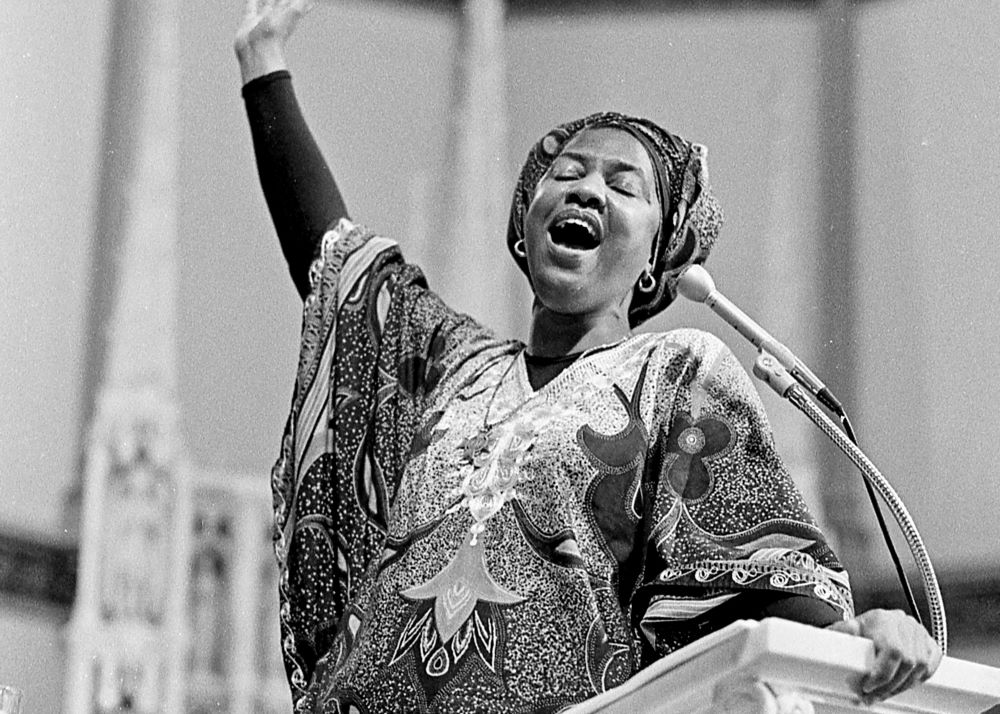By John Barnes, a doctoral candidate in systematic theology at Fordham University. His primary research interests lie at the intersections of Black religion and culture, pneumatology and Christology. His forthcoming dissertation, “Like the Rushing of a Mighty Wind: Embodiment, Being and the Construction of a Black Diasporic Pneumatology,” engages notions of spirit as the point of departure to investigate how the Black musical tradition blurs the distinction between the sacred and secular. John attends St. Charles Borromeo Parish in Harlem.
Excerpt from https://www.ncronline.org/opinion/guest-voices/gospel-music-brings-black-witness-catholic-liturgy
African American studies scholar Jon Michael Spencer argues that for Black people, the role of rhythm in corporate worship cannot be understated. He describes the rhythm as providing the pulse of the music, but it is the Holy Spirit that provides the impulse. It is this holy impulse in the context of Black worship that makes all the difference; the Spirit inspired impulse to move, clap, shout or dance in the context of Black worship is a sign of God’s sustaining presence in the community.
Gospel music is sacred music because it is centered on the witness of the crucified and risen Christ as Black people have received it. It is sacred because in its embodied expression, we affirm, by the power of the Holy Spirit, that despite the realities of an anti-Black world, we too are children of God.

Sr. Thea Bowman, a Franciscan Sister of Perpetual Adoration who is a candidate for sainthood, is shown at St. Augustine Church in Washington in 1986. She died in 1990. (OSV News/Catholic Standard/CNS file, Michael Hoyt)
Noted priest, theologian and liturgist Clarence Joseph Rivers connected the relationship between Black worship and the spirit in The Spirit of Worship. He wrote:
A singer who performs without feeling lacks soul. As in the original biblical concept of the spiritual, the spirit or the soul is the life principle, the source of life and liveliness, of dynamism and movement, of motion and emotion. That which is unmoved and unmoving is not spiritual, it is dead! To be spiritual is to be alive, to be capable of moving and responding to movement. Since the Spirit moves, that which does not move would seem to lack the presence of the Spirit.
The gospel music tradition takes seriously the psalmist’s invitation to make a joyful noise before the Lord and to come before His presence with singing (Psalm 100). Music as a constitutive part of the human experience has the potential to function as a mode of encounter. Music that is centered on the Incarnate Word helps provide the context for encounter with the Spirit. It is difficult to have a genuine encounter with the Holy Spirit and retain hatred or bigotry for the other in the worshiping community.
As we sojourn in a world and a church that continues to struggle with the scourge of racism, these Spirit-inspired worship experiences are places of radical, genuine encounter. They are not just encounters with the Holy Spirit, but also encounters with other culturally informed expressions of the faith that might be aesthetically different from your own. They are places where the impulse of the Spirit tears down the walls of racialized hatred and bigotry.
In her now famous 1989 address to the USCCB, Servant of God Sr. Thea Bowman said the following:
I bring my whole history, my traditions, my experience, my culture, my African-American song and dance and gesture and movement and teaching and preaching and healing and responsibility – as gifts to the church. I bring a spirituality … [that] is contemplative and biblical and holistic, bringing to religion a totality of mind and imagination, of memory, of feeling and passion, and emotion and intensity.
The tradition of gospel music provides the context for these gifts to be shared with the universal church. While this tradition was birthed out of the lived experience of Black Americans, its impact isn’t limited to the Black community. Its power and spiritual possibility transcends categories of race, offering the opportunity for people of every background and culture to encounter the Holy One in a transformative way.
As we celebrate Black History Month, I pray that the gifts that Black Catholics bring to the universal church might be celebrated with the same dignity and value as so many of the other rich cultural traditions that find resonance in the church. May the sound of Black worship be a reminder that like the wind, the Spirit of God blows where it wills, often in the places where we least expect.
